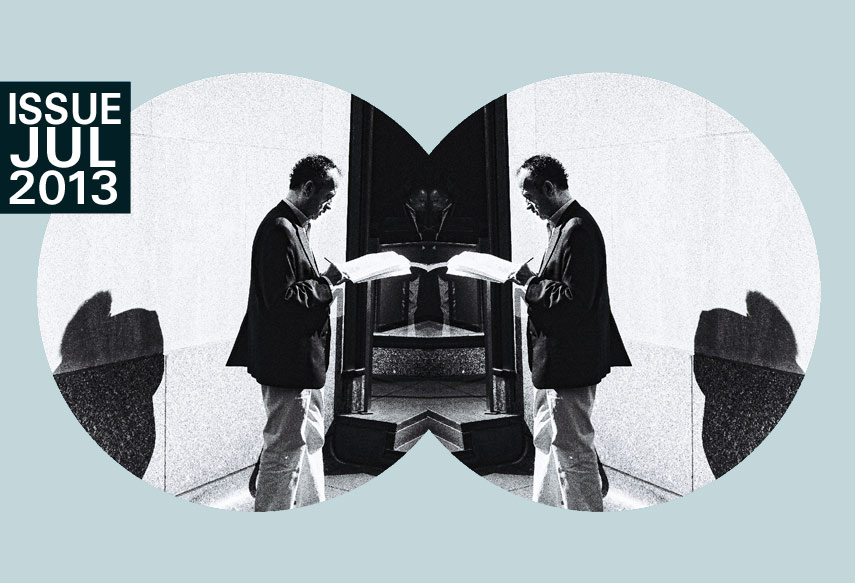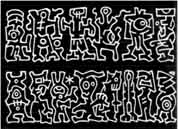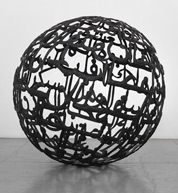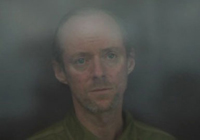- Featuring
- Can Xue Ghada Amer
- Fady Joudah
- Rachel Shihor
- David Mitchell
- László Krasznahorkai and Szilárd Borbély
Every translation is a conversation, each translator in dialogue with the original author, each language speaking to another. Asymptote's Summer issue is full of such conversations, perhaps most notably our exclusive interview with best-selling author turned translator David Mitchell, who together with his wife, K.A. Yoshida, translated a memoir of autism by the 13-year-old Naoki Higashida. We also got to speak to Tan Twan Eng, the first Malaysian Man Asian Literary Prize-winner, and avant-gardist Can Xue, whom Susan Sontag singled out as the one Chinese writer worthy of the Nobel Prize. Ottilie Mulzet finds her conversation partners translating Hungarian masters László Krasznahorkai and Szilárd Borbély. Q&As with playwrights Maria Cassi and Chantal Bilodeau, meanwhile, shine their light on this issue's Special Feature: Self-Translation in Drama; or, when a translator is faced with her worst enemy: herself!
Writing doesn't always have to be straightforward or even legible, as the asemic writing of Michael Jacobson shows. 2013 Griffin Poetry Prize winner Fady Joudah's elliptical essay on translation challenges the reader, just as Rachel Shihor's parabolic fiction does (and you can learn more about contemporary Israeli fiction in Yardenne Greenspan's overview). Our Fiction section has crystallized around the theme of departure; whether in László Krasznahorkai's tantalizing short piece, Wu Ming-Yi's tale about the cast-out second sons of Wayo Wayo Island, or Melanie Taylor Herrera's "The Voyage," set in 17th century Panama, all these stories address just what happens when we leave all that we have and are behind. The lyrical black-and-white photographs of Guillaume Gilbert, our guest artist, extend this theme throughout this issue, capturing frozen moments just before.
Beginning with an ekphrastic and closing with a meditation on sculpture, the poetry in this edition is profoundly concerned with the elemental: the basic structures of our physical and metaphysical worlds. Pierre Peuchmaurd's eye observes and unflinchingly records, Kim Kyung Ju's inner world is overwhelmed by its contact with the outside world; Ihor Pavlyuk, our first Ukrainian author, like a mussel, senses "the whisper/ Of distant tides." The attitude is one of "feeling the whole hunger," of attempting to express something large via the small and the sensual. Each poet is presented with an audio recording in the original language, sometimes, as with Ulrike Almut Sandig and Enrique Winter, with astonishing musical accompaniment.
Our enormous international translation endeavor, the JHK Project, will soon boast 25 (!) translations of Jonas Hassen Khemiri's "Open Letter to Beatrice Ask" (featured in our last issue and thereafter in the New York Times. Check out the 17 translations already published here.) The success of our IndieGoGo campaign and many many volunteer hours have now also made it possible to access our growing archive of global literature through—what could be more apt—a clickable world map. Try out our beta version as well as our new About page revamped to host our issues' video trailers; let us know what you think!
We'll leave you with three reminders: Our October issue plays host to Asymptote's annual English-language poetry feature and this time there's no unifying theme, no set task, our only question that your work (submit here) be exploratory, adventurous, involved. Then, the first entries for Asymptote's $1,000 translation contest, Close Approximations, judged by Eliot Weinberger and Howard Goldblatt, are already coming in (you can still send work! Deadline: 1 Sep 2013). Finally, though upwards of 15 new staff (watch for our official News release in a week or two) have joined through our recent June recruitment exercise, we are still looking for new team members to fill our Managing Editor (Administration), Executive Assistant (Personnel), Publicity and Fundraising Positions (guidelines here; available until filled). Remember, these summer days go by quick!
—Lee Yew Leong, Editor-in-Chief
Editorial Team for Issue Jul 2013
Editor-in-Chief:
Lee Yew Leong (Taiwan/Singapore)
Senior Editor:
Florian Duijsens (Germany/Netherlands)
Section Editors:
Lee Yew Leong (Taiwan/Singapore)
Aditi Machado (India/USA)
Caridad Svich (USA/UK)
Simon Morley (UK/South Korea)
Contributing Editors:
Howard Goldblatt (USA), Aamer Hussein (Pakistan/UK), Sylvia Lin (Taiwan/USA), Sayuri Okamoto (Japan/Italy),
Sim Yee Chiang (Singapore), Dylan Suher (USA) and Adrian West (USA)
Chinese Contributing Editor: Francis Li Zhuoxiong (Hong Kong/Taiwan)
Assistant Editors: Megan Berkobien (USA), Dolan Morgan (USA), Julia Sanches (Brazil/Spain)
Editor-at-large, Argentina: Maureen Shaughnessy
Editor-at-large, Central Asia: Alex Cigale
Editor-at-large, Hong Kong: Charlie Ng Chak-Kwan
Editor-at-large, Hungary: Ágnes Orzóy
Editor-at-large, India: Rahul Soni
Editor-at-large, Kenya: Natalya Din-Kariuki
Editor-at-large, Paris: Daniel Medin
Incoming:
Managing Editor (Content): Tara FitzGerald
Special Feature and Criticism Editor: Aaron Kerner
Contributing Editors: Brother Anthony of Taizé and Ellen Elias-Bursac
Editor-at-large, Croatia: Ervin Felić
Editor-at-large, Iran: Farzaneh Doosti
Editor-at-large, Korea: Jina Song
Editor-at-large, Macedonia: Christina Kramer
Editor-at-large, Malaysia: Nicole Idar
Editor-at-large, Slovakia: Julia Sherwood
Masthead for Issue Jul 2013
Fiction/Nonfiction/Feature/Criticism/
Interview: Lee Yew Leong
Poetry: Aditi Machado
Drama and Drama Special Feature: Caridad Svich
Visual: Simon Morley
Illustrations and Cover: Guillaume Gilbert
Guest Artist Liaison: Lee Yew Leong
Technical Manager: József Szabó
Graphic Design: Lee Yew Leong and Susan Lin
Events Planner: Laurel Burchfield
Executive Assistants: Charlie Ng Chak-Kwan and Alex Sham
Publicity (Chinese): Charlie Ng Chak-Kwan
Interns: Mounia Abousaïd, Tariq Adely, Jan Cao, Vivian Chih, Patricia Nash, Greg Nissan
Legal Counsel: Lindy Poh
Asymptote would like to acknowledge the support and/or contributions of: Balkenende Chew & Chia (Advocates & Solicitors), Adam Snyder, Aaron Posehn, Michael Stein, Scott Esposito, Will McGrath, Kasia Pilat, Anna Redman, Sarah Irving, Marcia Lynx Qualey, Yasmine Seale, Sharon Wang, Philip Jeyaretnam, Adrian Tan, Sherman Ong, Rachel Morgenstern-Clarren, Wah-Ming Chang, Luisa Chang, Anthony Pizzini, Little Ong, Joan Hua, Joey Rubin, Louise Court, Eliot Weinberger, Sanae Nakajima, Kodansha, Kazuto Yamaguchi (Kodansha), Andrew Lau, Farooq Alvi, Kevin Kunstadt, Nikki Barrow, and the more than 20 translators who stepped forward to volunteer for our JHK Translation Project.
Thanks go too to the more than 230 donors who backed us so generously during and after our Indiegogo campaign; to show our deep appreciation, we have inscribed your names into our hearts and onto our new Acknowledgments page here.




